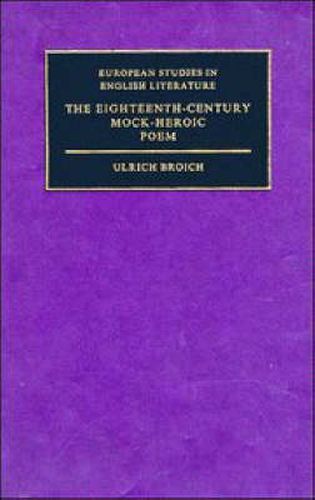Readings Newsletter
Become a Readings Member to make your shopping experience even easier.
Sign in or sign up for free!
You’re not far away from qualifying for FREE standard shipping within Australia
You’ve qualified for FREE standard shipping within Australia
The cart is loading…






Mock-heroic poetry is one of the most characteristic genres of English neoclassicism in the eighteenth century. It includes not only masterpieces such as Pope’s The Rape of the Lock and The Dunciad but also numerous minor poems. Derived from French models, the mock-heroic became something more than merely a parody of the serious epic: relieved of its gravity, it was nevertheless a legitimate and independent form of epic poetry. This book is the first comprehensive study of the theory, the conventions and the history of the mock-heroic genre. In the first part, Ulrich Broich shows how mock-heroic poetry combines the characteristics of various discourses - epic, comedy, parody, satire and occasional poetry. The ‘polyphonic’ genre which emerges from this analysis stands in ironic contrast to the neoclassical ideal of decorum in a harmonious unity of discourse and form. The second part traces the history of mock-heroic poetry: its foreign sources, its beginnings in England, the ‘rivalry’ with other forms of comic narrative, and its decline in the second half of the eighteenth century.
$9.00 standard shipping within Australia
FREE standard shipping within Australia for orders over $100.00
Express & International shipping calculated at checkout
Mock-heroic poetry is one of the most characteristic genres of English neoclassicism in the eighteenth century. It includes not only masterpieces such as Pope’s The Rape of the Lock and The Dunciad but also numerous minor poems. Derived from French models, the mock-heroic became something more than merely a parody of the serious epic: relieved of its gravity, it was nevertheless a legitimate and independent form of epic poetry. This book is the first comprehensive study of the theory, the conventions and the history of the mock-heroic genre. In the first part, Ulrich Broich shows how mock-heroic poetry combines the characteristics of various discourses - epic, comedy, parody, satire and occasional poetry. The ‘polyphonic’ genre which emerges from this analysis stands in ironic contrast to the neoclassical ideal of decorum in a harmonious unity of discourse and form. The second part traces the history of mock-heroic poetry: its foreign sources, its beginnings in England, the ‘rivalry’ with other forms of comic narrative, and its decline in the second half of the eighteenth century.